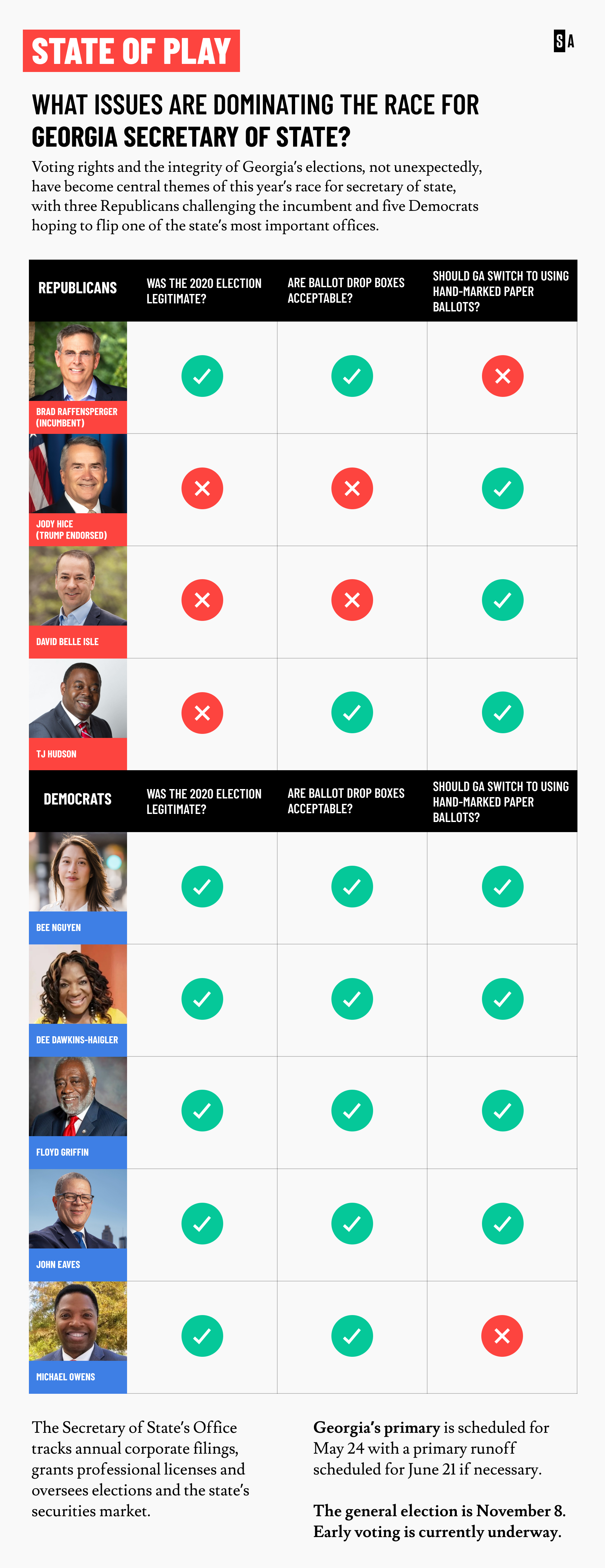Stay ahead of the curve as a political insider with deep policy analysis, daily briefings and policy-shaping tools.
Request a DemoElection ‘fraud’ claims, voting rights take center stage in Georgia primary race for Secretary of State

Illustration by Brittney Phan (State Affairs)
- Three Republicans are challenging the incumbent secretary of state Brad Raffensperger in the GOP primary.
- Five Democrats are vying to be their party's contender in the November general election.
- Election integrity and voting rights have dominated debates.
The Gist
Voting rights and the integrity of Georgia’s elections, not unexpectedly, have become central themes of this year’s race for secretary of state, with three Republicans challenging the incumbent and five Democrats hoping to flip one of the state’s most important offices.
What’s Happening
Incumbent Republican Secretary of State Brad Raffensperger faces primary challenges over his refusal to invalidate the election results in Georgia in favor of former President Donald Trump in 2020, with challengers from his own party pushing unfounded claims of widespread voter fraud. Raffensperger last week squared off in a debate with Trump-endorsed U.S. Rep. Jody Hice, former Alpharetta Mayor David Belle Isle, and former Treutlen County Probate Judge T.J. Hudson.
Meanwhile, Democrat contenders for the office – which tracks annual corporate filings, grants professional licenses, and oversees elections and the state’s securities market – pitched policy proposals to address doubts concerning the veracity of the state’s election process. Democratic primary voters will choose between state Rep. Bee Nguyen, former state Rep. Dee Dawkins-Haigler, former state Sen. Floyd Griffin, former Fulton County Board of Commissioners Chairman John Eaves, and cybersecurity engineer Michael Owens.
Georgia’s primary is scheduled for May 24 with a primary runoff scheduled for June 21 if necessary. The general election is on November 8. Early voting is currently underway.

This graphic shows where candidates stand on top issues in the race for Georgia’s secretary of state in the 2022 elections. (Credit: Brittney Phan for State Affairs)
Voting Rights
All the Democratic candidates have promised that if elected, they would work to strike down Georgia’s controversial election law, Senate Bill 202. The bill limits absentee ballot drop boxes, introduces photo ID requirements to request an absentee ballot, and gives the state the authority to take over local election boards, among other provisions.
The law is facing numerous legal challenges in federal court from voting rights groups as well as the U.S. Department of Justice, which alleges it violates the Voting Rights Act of 1965 which protects against race discrimination and discrimination against language minorities in voting.
“The bill disenfranchises and suppresses the vote of African Americans in this state,” Griffin said at the Atlanta Press Club debate last week.
Republicans challenging Raffensperger, in particular Hice, have charged that ballot drop boxes are not secure, and that “ballot harvesting” has taken place – charges denied by Raffensperger. Drop boxes were permissible under Georgia law prior to the 2020 election but became widespread due to the Covid-19 pandemic.
Hice wants to do away with drop boxes altogether while Raffensperger and Hudson defend the practice as being equivalent to mail-in (absentee) balloting, with post office boxes being just as secure.
Under Raffensperger’s administration, Fulton County’s Election Board entered a negotiated consent order to address mismanagement issues that resulted in long lines and missing absentee ballots in the June 2020 primary.
Election Integrity and Security
In the recent debate, Democrats swore to uphold and certify election results, even if they don’t like them.
Still, they pitched policies to shore up confidence in election results.
Nguyen, taking a position supported by some election-security experts, at the debate said the state should switch to hand-marked paper ballots, a position she has previously expressed as a lawmaker. After three recounts and an audit, she said, there’s no question the 2020 election results were legitimate.
It’s a position largely supported by fellow Democrats in the race with the exception of Owens, who said that, while it may be necessary under certain circumstances, there’s currently no indication that the hacking risk to Georgia’s elections systems would warrant invoking an emergency use of paper ballots.
“I don’t want to lean into fear,” he said.
Switching to hand-marked paper ballots is also a position that some GOP candidates for the office endorse.
Republicans have mostly taken shots at Raffensperger over his handling of the 2020 election, taking issue with ballot drop boxes and making claims of widespread non-citizen voting.
“Every allegation I checked out, I ran it down to the end of the line,” Raffensperger said, adding that non-citizen voting is his “number one” priority, even though his office found no instances of the practice in the 2020 election. Raffensperger has favored an amendment to the state constitution to ban noncitizen voting, a measure that failed to pass the Georgia Senate.
A review of voter registrants by Raffensperger’s office found 1,634 cases of pending voter registrations where citizen verification was called into question. Those cases were referred to local district attorneys and the registrations will remain pending until they are resolved. To date, there has been only one convicted case of a non-citizen attempting to vote in Georgia, a Gwinnett County woman, who faced a $500 fine in 2021 for votes cast in 2012 and 2016. Raffensperger’s office also found that in the 2020 election there were only four cases of dead people voting, zero cases of underage voters and fewer than 40 felons voting.
Outside of voting and election issues, candidates have weighed in on professional licensing, calling for everything from setting up satellite offices to expanding license reciprocity – the ability to use a professional license obtained in another state in Georgia – and implementing a 15-day licensing period for military spouses to make it easier for them to start working while stationed in Georgia.
Join The Conversation
What do you want to know about the election for Secretary of State? What other issues are important to you? Contact the author at: [email protected] or on Twitter: @alemzs.
Gov. Kemp calls on state agencies to be fiscally restrained amid record $16.5B surplus
The Gist Gov. Brian Kemp asked the state’s 51 government agencies for continued fiscal restraint when drafting their amended fiscal year 2025 and 2026 budgets. Most agencies adhered to his request even as the state’s general fund surplus hit a record $16.5 billion last month. Forty-five agencies, excluding state courts, followed the governor’s instructions to …
Georgia defies bomb threats as election chief declares a “free, fair and fast” vote amid record turnout
ATLANTA – Despite dealing with over 60 bomb threats, Georgia’s election chief said Tuesday the state’s general election went smoothly. Georgia had a record turnout with nearly 5.3 million people voting, Secretary of State Brad Raffensperger told reporters. Election officials in the state’s 159 counties have until 5 p.m. to certify votes. “We had a …
In the (state)house: Meet the newest members of the Georgia legislature
When lawmakers reconvene at the state Capitol on Jan. 13, there’ll be a cadre of new faces in the 236-member Georgia General Assembly, one of the nation’s largest state legislatures. All 236 statehouse seats were up for election this year. Most candidates ran unopposed. Incumbents in contested races easily kept their seats, with the exception …
2 young Democrats win Statehouse seats as Republicans hold majority
ATLANTA — Many Statehouse incumbents appeared to beat back challengers Tuesday, ensuring their return to the Capitol in January. Republicans retain control of the House and Senate. Two Generation Z candidates will join the 236-member Legislature as new members of the House of Representatives: Democrats Bryce Berry and Gabriel Sanchez. Berry, a 22-year-old Atlanta middle …




